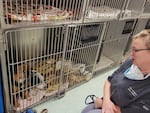A shortage of qualified veterinarians and veterinarian technicians has left fewer affordable options for Oregon pet owners.
For instance, Eugene’s spay and neuter clinic is no longer operating on large dogs and has cut back on small animal surgeries.

Dr. Kelly Hazzard talks to dogs Mabel, left, and Archie, center, at the Eugene Spay and Neuter Clinic.
Rebecca Hansen-White / KLCC
Dr. Kelly Hazzard, the Eugene clinic supervisor, said staffing shortages have limited her to vaccinations, wellness checks and half a dozen surgeries a day.
“We used to do up to 10 cats a day, but right now we’re doing six,” she said, “Four or five females and then one or two males. We don’t want to overload. We had a couple of extra procedures today, like one male turned into a girl, so that was an extra surgery we hadn’t planned on.”
Hazzard said she needs more staff at all levels to come close to meeting the demand for care, vet technicians, office workers, and another veterinarian with surgery experience.
The city has been relying on contracted veterinarians from other clinics because it was unable to hire a staff member, said Eugene Central Services Finance Manager Pavel Gubanikhin.
“After 10 months of advertising locally, regionally and nationally, we have not been able to get anybody to apply,” he said. “Quite frankly, the Eugene Spay and Neuter clinic is not unique in that regard because private veterinary practices, and veterinary care non-profit providers have been experiencing a lot of the same challenges.”
Jill Parker, president of the Oregon Veterinary Medical Association, said there are a few factors that have put stress on vet clinics over the last few years.
Some vets are retiring, or already left the industry during the pandemic because of burnout, or other reasons. At the same time, more and more Americans are adopting pets.
“We have an increased demand, and not enough veterinarians to meet that demand,” she said. “It’s not quite as simple as numbers, though, because there’s so many different types of practices and each of them have their own unique reasons why they have a hard time attracting veterinarians.”
Parker said significantly more veterinarians are being trained now than in past decades. She said Oregon State University, where she previously taught, has more than doubled its class size in the last 30 years. New veterinarian programs are also opening in other parts of the country.
But, she said low-cost spay and neuter clinics may not soon see the benefits of academia’s efforts to increase the pipeline, since heavy student debt may leave many graduates feeling that they can’t afford to work at a nonprofit, or local government clinic.
She said the average veterinary school student graduates with around $150,000 in loan debt.
“Small animal practices are likely to have their shortages resolved,” Parker said. “Now I think low-cost spay and neuter programs are going to have to be innovative with how they attract people into that.”
Parker said solutions might be asking what veterinarians need to stay in the field, whether that’s more flexible hours or other accommodations. It could also include increasing the pay and responsibilities for veterinarian technicians, who receive two to four years of training and can perform many non-surgery duties, freeing up a veterinarian.
Hazzard said she’s often the only vet many people ever see. She said she’s heard from pet owners who drove over an hour to get to her clinic, because they couldn’t afford a surgery, vaccines or dewormer at a private veterinary office.
She said she’s hoping the city will be able to hire a vet tech, or assistant, to expand the number of animals they are able to help. Hazzard says she anticipates Eugene’s clinic will reopen its surgery waitlist next month.
“People that don’t have money, people who are unhoused, everybody’s going to have pets, and they all need care,” she said.